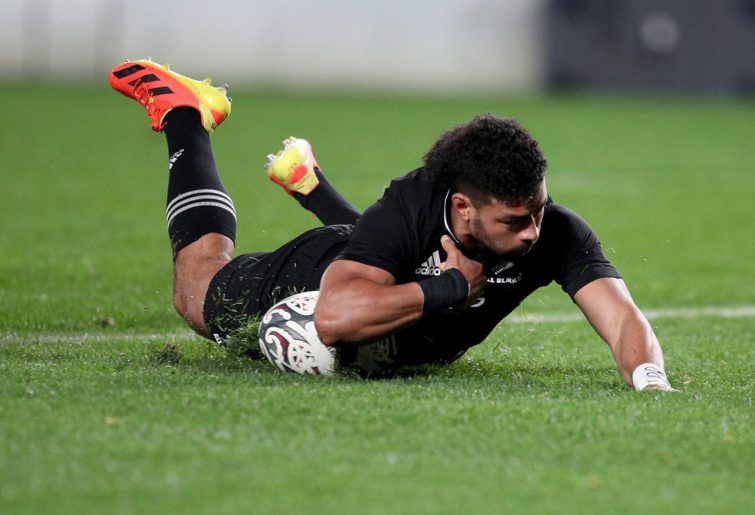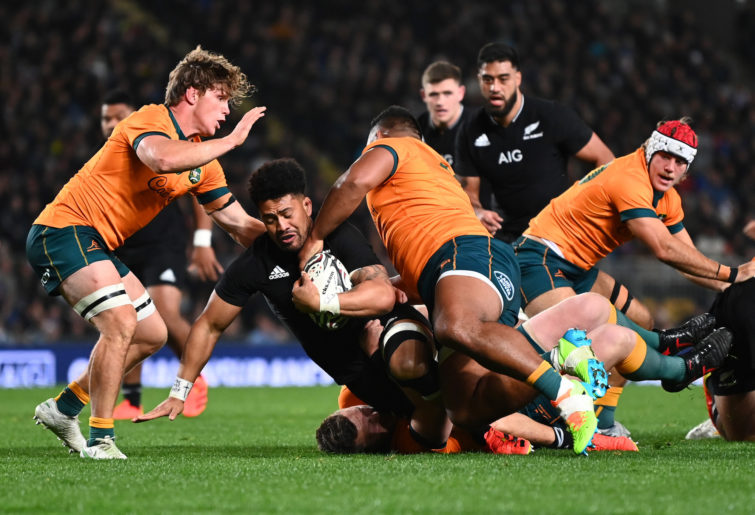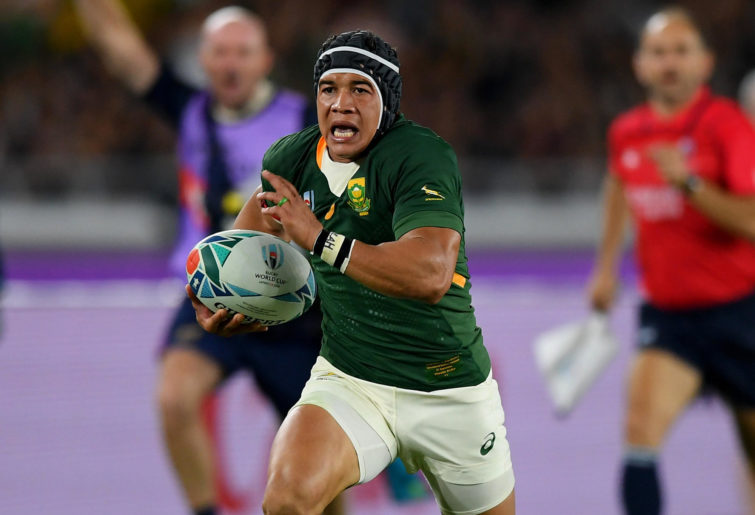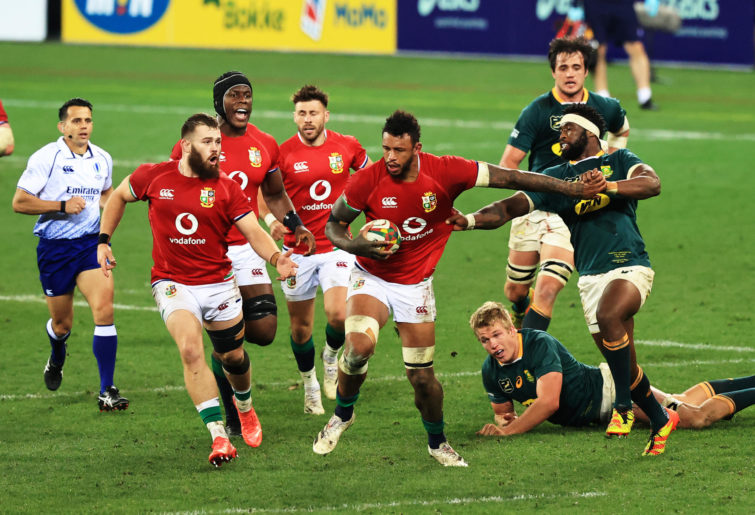Since their last win at Eden Park in 1986, the Wallabies have endured what is now 21 straight losses at New Zealand’s home of rugby, many by margins in excess of 20 and 30 points.
That’s why in the 64th minute of Saturday’s first Bledisloe Cup match, when Damian McKenzie planted the ball on the same patch of grass that David Havili had found six minutes before, with the score out to 33-8 and counting, it felt like familiar territory.
That the Wallabies finished off the match strongly – easily winning the battle of the benches, scoring three late tries and closing the score to 33-25 – tells us a few things about Dave Rennie’s side that sets it apart from recent iterations.
More on that in a moment. The reason things got to 33-8 in the first place tells us a few things about Rennie’s side that are common to recent versions.
Both sides were slow out of the blocks, seemingly confused by what was or wasn’t possible in the tricky, swirling conditions. The All Blacks’ passing game stuttered, while their defenders never settled on where the offside line lay.
The Wallabies, meanwhile, fouled their first five lineouts, and with Tom Banks seemingly happy to chip off only 15 metres at a time, they failed to take full advantage of an early string of penalties.
Ironically, it was a lineout that delivered the Wallabies the opening try, Hunter Paisami spearing onto a long throw before sending a willing and capable Andrew Kellaway away for his debut Test score.
But in a familiar scenario, the Wallabies failed to exit effectively from the restart, captain Michael Hooper ruled to have chased forward ahead of the clearing kick.
The Wallabies will have known that it’s an area of the game New Zealand officials have been red hot on all season, making it all the more disappointing that they invited commentators to again remind everyone of the All Blacks’ propensity for scoring tries right on the break.
Captain Sam Whitelock duly turned down the almost certain three, pointed to the sideline, and Sevu Reece’s quarterback sneak was good enough for a 16-8 halftime lead.
Things hotted up on the return, Richie Mo’unga sparking the try of the season that wasn’t, before Paisami picked him out with a pass that didn’t need to be thrown. Up went the intensity from the home side, and – all too familiarly – the Wallabies failed to stay with them.

(Photo by Dave Rowland/Getty Images)
Both tries had a familiar ring, with strong, purposeful carrying taking the ball to the goal-line, before new centurion Aaron Smith recognised where the space was and found his wide men.
That’s where it ended for the All Blacks, the Wallabies drawing from same well that gave them their narrow series victory against France, albeit that there was a feeling they were benefitting from the inhibition that comes with knowing you can’t win.
The trick for the selectors will be to determine how much weighting to apply to performances in the final quarter against those from the first three. Was it the All Blacks who took their foot off the pedal and dropped their intensity, or was it the Wallabies who finally seized the initiative?
Marika Koroibete will come straight back in, Matt Philip is pressing for a start, and there will be more debate as to whether Taniela Tupou needs more game time. In the midfield, Matt To’omua looked sharper than he has all season, and while Paisami is a disruptor who has a knack of making things happen, not all those events benefit his own side.
The Wallabies will be frustrated, knowing that they are not miles off the pace, but also because they will know that the All Blacks were not at their best. In that sense, this was a missed opportunity.
As for the All Blacks, 18 penalties is a ridiculous number to concede, with the returning Brodie Retallick responsible for at least four on his own. An honest appraisal of their discipline alone will be enough to deliver improvement next week.
Of greater concern for the home side will be the lack of cohesion in their loose forwards. Ardie Savea, Dalton Papalii and Akira Ioane failed to convince as a unit, and don’t be surprised to see a return to a more traditionally balanced eight-seven-six combination.

(Photo by Hannah Peters/Getty Images)
There was an amusing moment in the lead-up to the match, with a Canberra journalist at Thursday’s press conference, in her desire to anoint Dan McKellar as the next Wallabies coach, inquiring of Dave Rennie whether or not he will be prepared to stand aside.
Rennie brushed it off with a smile, but even allowing for the parochial nature of the question, the nature of it reflects a modern trend to pass judgment on coaches indecently quickly, and move them along, no matter the underlying detail.
It’s a situation faced by New Zealand coach Ian Foster, who it seems, just three games into his second season, has already been found guilty of irredeemable crimes against New Zealand rugby, and so must be moved on, post-haste.
Foster’s greatest failing is that he wasn’t born Scott Robertson. There are question marks around his coaching and selection – as there should be of all coaches – but his day of reckoning must come after he has had the opportunity to develop his side through a second full season, not every single time a play doesn’t go to plan.
One interesting take from the match was that Aaron Smith’s first box kick came in the 60th minute. In the Cape Town series decider, Springbok halfback Cobus Reinach took only 25 seconds to launch his first kick skyward, followed just 55 seconds later by the Lions’ Ali Price.
No surprises there, given how the series played out, just as it was no surprise that the try that finally gave the Springboks their second-half lead came from a disputed box kick.
Unfortunately for the Lions, it was their familiar inability to grasp the loose ball that cost them – three players reaching in for the same pill – which left space for the Boks to finally free up Cheslin Kolbe to show his finishing skills.

(Photo By Ramsey Cardy/Sportsfile via Getty Images)
Arguments will rage back and forth about scrum shenanigans, but it was two individual errors in the first half that most cruelled the Lions’ chances. Inexplicably, Liam Williams forgot rugby’s most basic draw and pass skill, ignoring the free flying Josh Adams outside him, instead seemingly determined to stamp a metaphor for the series by crashing into contact.
It was a costly mistake, as was Tom Curry’s decision to shear off the front of a maul and illegally take Siya Kolisi with him, when a second try to hooker Ken Owens seemed imminent. With tries at such a premium throughout the series, the Lions could ill-afford to so wantonly waste their opportunities.
Clearly underdone heading into the series, South Africa backed their suffocating defensive screen to deliver them the result. The risk was that this increased the chances of a close, lottery-style outcome, but it is hard to recall a series where such unbending self-belief and rigid adherence to the game plan has been so rewarded.
As has been well documented, Rassie Erasmus got a lot wrong in this series, and he will face his day of judgment this week when World Rugby calls him to account for his calculated video attack on first-Test referee Nic Berry.
But what Erasmus got right was to recognise that in such a hot contest, the importance of goal-kicking was paramount, and how his sharpshooter Handre Pollard was a little bit out of sorts on the shifty Newlands turf.
Altering his bench to include 37-year-old Morne Steyn to reprise his 2009 heroics and calmly decide matters with two late penalty goals was a masterstroke.
Even if the series won’t be remembered for the quality of the rugby, both camps deserve full credit for making it happen in the first place.

(Photo by David Rogers/Getty Images)
And while a Lions tour without crowds reminds me of a wedding a few years ago where the caterer ran into such chronic and insurmountable problems with a kitchen failure that they resorted to ordering in buckets of KFC, the fact remains that everybody got fed.
The series was marred however by the incessant intrusion of coaches, water carriers and physios from both camps onto the field, blowing out game times and leaving viewers frustrated with the stop-start nature of the play.
Erasmus was captured among his pack, laying down the law, in the 42nd minute. What on earth was he telling his players that couldn’t have been said two minutes earlier at halftime? Why was he even allowed on the field at all?
Worse was the shameless intrusion of long-time physio Rene Naylor after the Lions turned down a kickable penalty in the 68th minute, electing instead to kick for the corner.
Throughout the next play, up until the point prop Mako Vunipola was held up over the try line, Naylor can be seen standing just behind the try line, barking orders at players, imploring them to hold fast, and directing them to fill gaps in the defensive line.
Even after the five-metre scrum was awarded, Naylor remained in the in-goal area, near the try line – well in the field of play – almost appearing to act as another player in the defensive line.
None of this carry-on is due to innocent exuberance or over-excitement. Nor does not change the record books. But such an extreme, calculated desire to win at all costs does, in the minds of many neutrals, chips away at the legacy of a side that frankly, as world champions, never needed to adopt such siege-like, underdog status in the first place.
World Rugby, when they are done with Erasmus, would do well to restate both the spirit and the letter of the law when it comes to on-field intrusions, and ensure that no future series is tarnished to the extent that this one was.
Nobody can argue that one style of rugby is more virtuous than any other. It is the beauty of the game that there are different pathways to victory, and it the choice of every side to adopt the one that best suits them.
But whichever route is chosen, let the players contest matters by themselves, without a cast of hangers-on infesting the pitch. Rugby is designed to be played 15 versus 15. Let’s keep it that way.
































































































